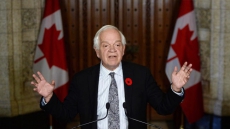OTTAWA — The Bank of Canada has embarked on a three-year quest to explore lessons learned since the financial crisis and attempt to brace for turbulence that may lie ahead.
Carolyn Wilkins, the central bank's second-in-command, said the launch of what the institution calls an "ambitious research agenda" will examine how other countries responded to the 2008 crisis, an event that led some nations to drive their conventional monetary policy to the edge.
Wilkins said it's important to be innovative with existing tools because post-crisis conditions have cut Canada's potential for economic growth without boosting inflation.
The senior deputy governor said if the Bank of Canada continues to use two per cent as its inflation target, there's a greater chance in today's environment that policy interest rates will tumble to zero.
The five-year, inflation-control agreement between the Bank of Canada and the federal government will be up for renewal after it expires next year.
"The current inflation-targeting framework is working well, and so the bar for change is high, but history tells us that we can't cling indefinitely to a particular way of doing business," Wilkins said in her speech Friday in Toronto at the Rotman School of Management and the Munk School of Global Affairs.
"One important challenge that central banks now face, many of them, is that conventional monetary policy is stretched to its limits in many countries, where policy interest rates are at, or below, zero."
The Bank of Canada, Wilkins added, has already begun taking a closer look at innovative monetary-policy tools that have been used by central bankers around the world, including asset-purchase programs, or quantitative easing, and negative nominal interest rates.

The bank's plan also aims to examine ways to respond to global changes already underway.
Wilkins underlined several examples such as the rise of alternative payment methods such as PayPal and the sharing economy's growing popularity through services like Uber.
"We have to envisage a world in which people mostly use e-money, perhaps even one that's not denominated in the national currency, like Bitcoin," Wilkins said, referring to the virtual currency.
"This would create a new dynamic in the global monetary order and one in which central banks, quite frankly, would struggle to implement monetary policy."
Canada has a history of being a monetary-policy innovator, she said.
Wilkins said in 1950 it became the first industrialized country to adopt a floating exchange rate.
In 1991, following years of climbing inflation and interest rates, the Bank of Canada became the second central bank in the world to introduce an inflation-targeting regime, even though, she added, many experts viewed it as unworkable.
"In reality, this success (of inflation targeting) probably distracted central banks from confronting the hard questions about the buildup of financial risks that led to the global crisis," she said.
"It's a stern reminder that we must resist confirmation bias and complacency."
The Bank of Canada will also invest more in beefing up its own economic modelling. The goal is to help it better inform federal authorities about the best combinations of potential policy decisions — whether they be monetary, fiscal or macro-prudential.


